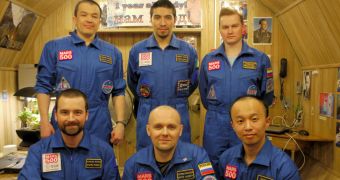Two Europeans, three Russians and one Chinese will “return to Earth” on November 4, when the Mars500 experiment currently being housed at the Institute of Biomedical Problems (IBMP) ends.
The research project has been carrying one for more than 18 months, with the six pseudo-astronauts carrying out a return trip to Mars. The experiment basically simulates the conditions a crew will have to endure during an actual trip to the Red Planet.
All 6 participants embarked on this endeavor in June 2010, and have been locked in a set of chambers at the IBMP ever since. The primary goal of the experiments is to figure out how humans deal with the psychological effects of being confined together in such a small place for such a long time.
At this point, their task is nearing completion, as their bogus spacecraft is scheduled to arrive to Earth on November 4, after completing a successful Martian mission. The astronauts will then have to complete a 4-day stay in quarantine, before being reunited with their families and loved ones.
According to officials at the European Space Agency and the Russian Federal Space Agency – which organized Mars500 together – the experiment replicated all aspects of a trip to Mars except for weightlessness, radiation and actual interplanetary spaceflight.
During the experiment, the crew has “‘flown’ to Mars, ‘landed’ on their destination planet and made several spacewalks on the look-a-like <artian terrain. They have been faced with monotony, delayed communications and complete lack of daylight in their windowless habitat,” an ESA statement says.
“The crew consists of ESA-selected Diego Urbina (Italian/Colombian) and Romain Charles (French); Sukhrob Kamolov, Alexei Sitev and Alexandr Smoleevski from Russia; and Wang Yue from China,” the document adds.
Seeing how NASA is planning to carry out a manned Martian mission around 2035, an experiment such as this one has a lot of valuable lessons to teach. As technical problems are surpassed, only the human factor remains as a potential block facing such an ambitious mission.
“The crew has been conducting dozens of experiments, producing data that help scientists, engineers and operators to evaluate what the space travelers of the future will go through,” the press release adds.
Fortunately, the Mars500 crew went through its paces without any significant conflict between its members. This offers good signs for future space exploration missions, since the behavior of the astronauts on board could largely dictate the success of space exploration.

 14 DAY TRIAL //
14 DAY TRIAL //